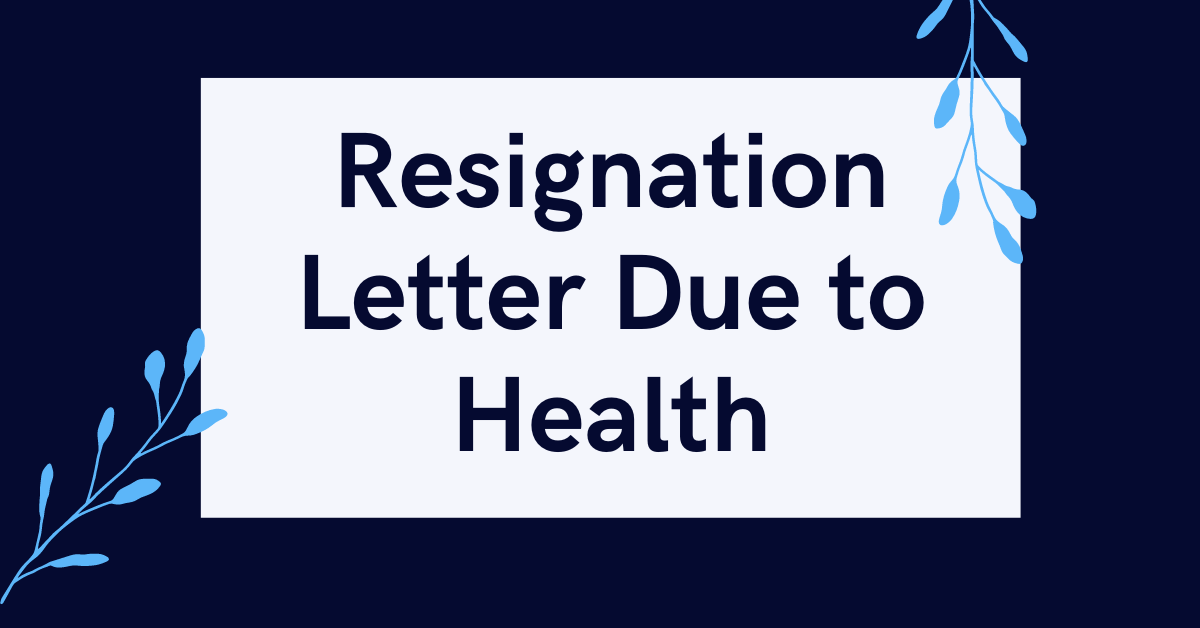In the realm of professional life, sometimes health challenges lead us to make tough decisions. A resignation letter due to health is a formal communication conveying an employee’s decision to step down from their position due to health-related reasons. Its purpose is straightforward: to inform the employer about the necessity of resigning from the current role due to health issues. This type of letter serves as a crucial bridge in maintaining professional courtesy and transparency during a challenging period.
In this article, we aim to provide support to those facing the daunting task of crafting a resignation letter due to health issues. Understanding the complexities of such a situation, we are here to offer practical assistance. The upcoming sections will present templates and examples of resignation letters tailored to health-related resignations. Our goal is to alleviate the burden of articulating such a sensitive matter by providing users with well-crafted samples. Crafting an effective letter can be challenging, but with our creative and user-friendly examples, we strive to make the process more manageable for individuals navigating this difficult decision.
Facing health-related decisions in the professional sphere is undoubtedly a challenging ordeal. Acknowledging the emotional and professional impact of such a choice, our article aims to provide not only the necessary tools for drafting a resignation letter but also emotional support through thoughtful content. We understand the unique circumstances surrounding health-related resignations and aim to guide individuals through the process with sensitivity and empathy. Our templates and examples are designed to serve as a foundation, enabling individuals to express their circumstances with clarity while maintaining the professionalism required in such situations.
Ultimately, the objective of this article is to empower individuals who find themselves at this crossroads, offering them a roadmap for a crucial aspect of the journey—communicating their decision effectively. Health-related resignations are sensitive matters, and our commitment is to provide guidance that eases the burden, fosters understanding, and facilitates a smooth transition during a challenging period.

Sample of Resignation Letter Due to Health
[Your Name]
[Your Address]
[City, State, Zip Code]
[Email Address]
[Date]
[Recipient’s Name]
[Company Name]
[Company Address]
[City, State, Zip Code]
Dear [Recipient’s Name],
I am writing to formally resign from my position as [Your Position] at [Company Name], effective [last working day, typically two weeks from the date of the letter]. This decision has not been an easy one, but due to unforeseen health challenges, I find it necessary to prioritize my well-being and step away from my current professional commitments.
I want to express my gratitude for the opportunities and experiences I’ve had during my time at [Company Name]. The support of my colleagues and the enriching work environment have contributed significantly to my professional growth. However, my current health situation requires me to focus on recovery and well-being, necessitating this difficult decision.
I understand the importance of a smooth transition, and I am committed to ensuring that my responsibilities are transitioned seamlessly. I am open to discussions regarding the transition process and would be happy to assist in any way possible during this period.
I appreciate your understanding and support during this challenging time. I am grateful for the understanding of the entire team at [Company Name]. I have truly valued my time here and hope that our paths may cross again in the future.
Thank you for the opportunities and support.
Sincerely,
[Your Name]
[Your Position]
How to Write a Resignation Letter Due to Health

1. Understanding the Need for a Resignation Letter Due to Health:
Writing a resignation letter due to health reasons is a sensitive task. Start by acknowledging the necessity of such a letter and the importance of communicating your situation professionally. Outline the key reasons that lead individuals to make this difficult decision, emphasizing the need for clarity and empathy in your written communication.
2. Choosing the Right Tone and Language:
Crafting a resignation letter requires striking the right tone. While the situation may be challenging, maintain a professional and composed language throughout the letter. Employ words that convey sincerity and gratitude for the opportunities provided by the organization. It’s essential to balance honesty about your health condition with a positive and appreciative attitude.
3. Structuring Your Resignation Letter:
A well-structured letter ensures clarity and readability. Begin with a formal salutation, followed by a concise yet comprehensive opening paragraph stating your intention to resign due to health reasons. Subsequent paragraphs can delve into more specific details or express gratitude for the experiences gained while working for the company. Conclude the letter on a positive note, expressing goodwill and willingness to assist during the transition.
4. Expressing Gratitude and Professionalism:
Show appreciation for the support and understanding received during your tenure. Emphasize the positive aspects of your time with the organization, reinforcing that your decision is primarily based on personal health considerations. Maintaining professionalism is key; express your gratitude without undermining the seriousness of your health condition.
5. Providing Adequate Notice:
In most cases, it is customary to provide a notice period before your departure. Specify your last working day, typically two weeks from the date of the letter. Offering this notice demonstrates your commitment to ensuring a smooth transition and allows your employer to plan accordingly.
6. Offering Assistance in Transition:
Assure your employer of your willingness to assist in the transition process. Whether it’s training a replacement, documenting your responsibilities, or providing insights into ongoing projects, extending a helping hand demonstrates professionalism and ensures a positive exit.
7. Closing with a Positive Note:
End your resignation letter on a positive and optimistic note. Reiterate your gratitude for the opportunities provided and express hope for the organization’s continued success. Convey your desire to stay connected and leave the door open for potential future collaborations.
Remember, a well-crafted resignation letter not only communicates your departure but also leaves a lasting impression of professionalism and gratitude.
FAQs about a Resignation Letter Due to Health
Many individuals find themselves in the challenging situation of needing to craft a resignation letter due to health concerns. In this FAQ section, I’ll address some common questions surrounding this topic. Remember, every situation is unique, so consider these responses as general guidance rather than strict rules.
1. Why is it necessary to write a resignation letter due to health?
In my opinion, a resignation letter due to health provides a formal and documented way of communicating a significant life event. It helps in maintaining transparency with your employer about the reasons for leaving, fostering a sense of understanding and cooperation.
2. How do I balance honesty about my health without revealing too much?
Crafting a delicate balance is crucial. While it’s important to be honest about your situation, you can focus on the impact on your ability to perform your role rather than divulging extensive medical details. This maintains a level of privacy while providing clarity.
3. Should I mention my gratitude for the work experience in the letter?
Expressing gratitude is a positive aspect of any resignation letter. Acknowledging the opportunities and experiences gained during your tenure can leave a lasting positive impression and foster goodwill in your professional network.
4. What is the ideal notice period for a resignation due to health reasons?
In my opinion, the ideal notice period is typically two weeks. However, this can vary based on your employment contract and the nature of your role. Providing a reasonable notice period helps in ensuring a smooth transition for both you and your employer.
5. How can I offer assistance during the transition without overcommitting?
You can offer specific ways to assist, such as documenting your tasks, providing training sessions, or being available for questions during the transition period. This demonstrates professionalism and a commitment to facilitating a seamless handover.
Remember, these answers are general suggestions, and it’s advisable to consider your specific circumstances and company policies when dealing with a resignation due to health.
RELATED:
Encouragement Letter to a Friend
Letter to Request Leave Of Absence
